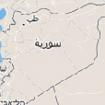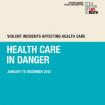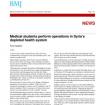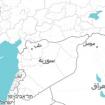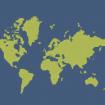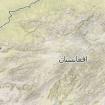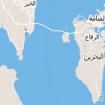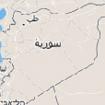News, blog posts, and event announcements. Other websites are welcome to cross-post this material with attribution and a link to the original.
What's New
05/16/2013
The Center for Strategic and International Studies hosted a roundtable discussion on Attacks on Syria’s Medical Personnel and Facilities on May 10. Leonard Rubenstein, chair of the Safeguarding Health in Conflict coalition, was one of the speakers, along with Zaher Sahloul of the Syrian American Medical Society (a member of Safeguarding Health in Conflict), Stephen Cornish of Médecins Sans Frontières, and Dorothy Shea of the US Department of State.
05/15/2013
A new study by the International Committee of the Red Cross (ICRC), entitled “Violent Incidents Affecting Health Care,” reveals that at least 921 violent incidents against health-care personnel, infrastructure and wounded or sick people took place in 2012. The study conducted in 22 unnamed countries affected by armed violence underlines a worrying trend: assaults on health-care personnel, facilities and vehicles in conflicts and other emergencies leave millions around the world without care just when they need it most.
05/14/2013
A doctor who recently returned from a trip to Syria has condemned the “destruction of the Syrian health system” and attacks on medical staff. Zaher Sahloul, president of the Syrian American Medical Society and a doctor in Chicago, told a meeting convened to discuss attacks on health facilities in Syria about the fear under which many doctors work.
05/14/2013
Humanitarian assistance groups in Washington are warning that the health care system has become a deliberate target in the increasingly brutal civil war in Syria, presenting major challenges to addressing the humanitarian and refugee crises spurred by the conflict.
05/13/2013
Syria, Somalia, Afghanistan, Myanmar and the Democratic Republic of Congo are the toughest places for aid workers, who not only struggle to reach vulnerable people due to conflict, but are also killed for being seen to help opposing groups, the head of medical charity Medecins Sans Frontieres (MSF) said.
05/13/2013
The Taliban has ended its war on polio vaccination workers and admitted immunisation is the only way to protect children from the disease, its leadership said in a statement issued today. The announcement comes just weeks after the Afghan government launched a new campaign to immunise more than eight million children between six months and five years old throughout the country. It said it had trained 46,000 volunteers to conduct the campaign which is funded by the American aid agency USAID, the World Health Organisation and Unicef.
05/08/2013
The law says hospitals, ambulances and health-care workers must be protected and should never be targeted as they carry out their regular duties. This is often far from the reality. Worldwide, the lack of safe access to health care is causing untold suffering to millions of people. Through the voices of doctors, nurses, ambulance drivers and patients, this film shows the human cost of violence against health-care workers and facilities.
05/04/2013
A group of Bahraini health workers have found themselves on the frontlines of a battle over medical neutrality as the aftershocks of the Arab Spring continue to rumble through the Gulf island kingdom. In theory, medical neutrality is a simple concept: physicians must be allowed to care for the sick and wounded; soldiers must receive care regardless of their political affiliations; and all parties must refrain from attacking and misusing medical facilities, transport, and personnel.
05/02/2013
The Center for Strategic and International Studies (CSIS) Global Health Policy Center and CSIS Middle East Program will host a roundtable discussion on Attacks on Syria's Medical Personnel and Facilities on Friday, May 10, 2:00-4:00 p.m. (EDT).
04/30/2013
President Obama affirmed Tuesday that there’s evidence Syrians have been attacked with chemical weapons—in particular, nerve gas. But that's not the same as proof positive. “We don't know how they were used, when they were used, who used them,” Obama said. “We don't have a chain of custody that establishes what exactly happened.”


